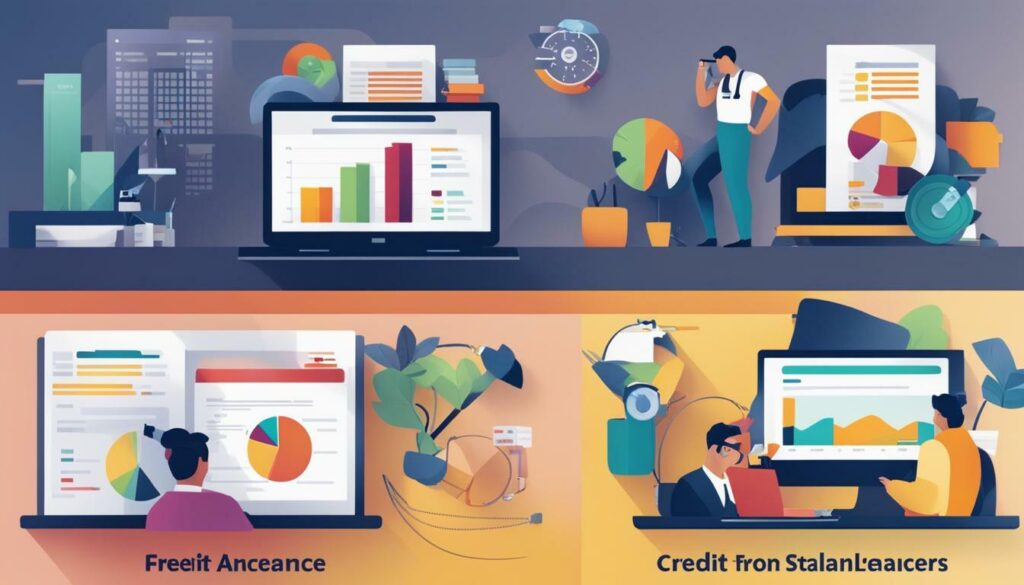Understanding Credit Reporting for Gig Economy Workers: Your Guide

Welcome to your comprehensive guide on credit reporting for gig economy workers in the United States. In today’s rapidly evolving workforce, more and more individuals are finding employment opportunities in the gig economy. Whether you’re a freelancer, independent contractor, or participate in on-demand work, understanding how credit reporting works is crucial for your financial well-being.
Key Takeaways:
- Income earned in the gig economy is taxable and must be reported on a tax return, regardless of the nature of the work.
- Determining your worker classification as an employee or self-employed is important for understanding your tax obligations.
- Gig workers should keep accurate financial records, deduct eligible expenses, and file and pay taxes for their gig work.
- Digital platforms that facilitate gig work have responsibilities in classifying workers and reporting payments for tax purposes.
- Researching pay rates, budgeting for taxes, and being aware of potential costs are essential for gig workers.
Now that you have an overview of the importance of credit reporting for gig economy workers, let’s explore the intricacies of credit reporting in the gig economy and how it differs for independent contractors compared to traditional employees.
What is the Gig Economy and How Does it Affect Credit Reporting?
Before delving into credit reporting specifics, it’s important to understand the gig economy and its implications on credit history and scores for gig workers. The gig economy, also known as the sharing economy or access economy, involves earning income through on-demand work, services, or goods provided via digital platforms. This includes freelancing, ride-sharing, food delivery, and various other gig work opportunities. It has rapidly grown in recent years, offering flexibility and additional income streams for individuals.
Gig workers, often self-employed or independent contractors, face unique challenges when it comes to credit reporting. Unlike traditional employees who receive a steady paycheck from an employer, gig workers have income that can be irregular and unpredictable. This can make it difficult to establish a consistent credit history and maintain a high credit score.
🚨 TUIC Errors + Low Credit Score?
CreditScoreIQ helps you build credit faster by reporting utility bills to all 3 bureaus—while you dispute errors.
Start Building Credit Today →Income earned in the gig economy is taxable and must be reported on a tax return, regardless of whether it is part-time, temporary, or side work. Gig workers need to determine if they are classified as an employee or self-employed, as this affects their tax obligations.
In addition to the irregular income, gig workers may also face obstacles in obtaining credit due to the nature of their work. Lenders and financial institutions often rely on stable employment and consistent income when evaluating creditworthiness. Without traditional employment records, gig workers may need to provide alternative documentation, such as bank statements or invoices, to demonstrate their ability to repay debts.

To navigate these challenges and improve their credit reporting, gig workers should keep detailed records of their income, expenses, and financial transactions. This documentation can help substantiate their financial stability and enhance their credit profile. It’s also important for gig workers to carefully manage their debts, make timely payments, and avoid excessive credit utilization to maintain a positive credit history.
Table: Key Factors Affecting Credit Reporting for Gig Workers
| Factor | Impact on Credit Reporting |
|---|---|
| Irregular Income | Difficulty in establishing consistent credit history |
| Self-Employment Status | Potential challenges in obtaining credit due to lack of traditional employment records |
| Documentation | Need to provide alternative documentation to substantiate income and financial stability |
| Debt Management | Importance of managing debts, making timely payments, and avoiding excessive credit utilization |
Understanding the gig economy and its impact on credit reporting is crucial for gig workers looking to optimize their financial well-being. By staying informed, maintaining accurate financial records, and responsibly managing their credit, gig workers can overcome the challenges and thrive in the evolving landscape of the gig economy.
Understanding the Differences in Credit Reporting for Gig Workers
Credit reporting for gig workers can differ from the traditional credit reporting system, requiring a deeper understanding of how freelancers and on-demand workers are assessed by credit agencies. While traditional employees may have a steady income and a more predictable financial situation, gig workers often face fluctuating income and irregular payment schedules. This can present challenges when it comes to establishing and maintaining a credit history.
One key difference in credit reporting for gig workers is the evaluation of income stability. Credit agencies typically rely on a consistent income history to assess creditworthiness. However, gig workers may not have a traditional employment record or a stable income stream. This can make it more difficult for gig workers to demonstrate their ability to repay debts and may result in lower credit scores.
Another factor to consider is the documentation of income and financial records. Gig workers are often responsible for managing their own financial records, including tracking income, expenses, and tax payments. This information is crucial for credit reporting agencies to evaluate creditworthiness. Therefore, gig workers should maintain accurate and up-to-date financial records to present a comprehensive picture of their financial situation to credit agencies.
| Key Differences in Credit Reporting for Gig Workers |
|---|
| Fluctuating income and irregular payment schedules |
| Lack of traditional employment record |
| Importance of documenting income and financial records |
Additionally, gig workers should be aware of the importance of managing debts and maintaining a low credit utilization ratio. This ratio measures the amount of credit used compared to the total credit available. It is an important factor in credit scoring models and can impact a gig worker’s creditworthiness. By minimizing debt and using credit responsibly, gig workers can improve their credit profiles and increase their chances of accessing favorable credit opportunities.
In summary, understanding the differences in credit reporting for gig workers is crucial for navigating the gig economy successfully. By recognizing the unique challenges faced by freelancers and on-demand workers and taking proactive steps to manage their credit responsibly, gig workers can strengthen their financial futures and achieve their goals.
 To enhance your financial reputation and secure a stable future, it’s crucial to implement best practices for credit reporting in the gig economy. As a gig worker, your credit history plays a vital role in your ability to secure loans, mortgages, and other financial opportunities. By understanding and actively managing your credit reporting, you can establish a strong financial foundation.
To enhance your financial reputation and secure a stable future, it’s crucial to implement best practices for credit reporting in the gig economy. As a gig worker, your credit history plays a vital role in your ability to secure loans, mortgages, and other financial opportunities. By understanding and actively managing your credit reporting, you can establish a strong financial foundation.
Here are some key best practices to consider:
1. Maintain a positive credit history: Pay your bills on time and in full, as this demonstrates your reliability and financial responsibility. Late payments can have a negative impact on your credit score and make it harder to access credit in the future.
2. Build credit as a gig worker: If you’re new to the gig economy or have limited credit history, consider options like secured credit cards or credit builder loans to establish a positive credit track record. These tools can help demonstrate your creditworthiness and improve your credit score over time.
3. Manage debts wisely: Keep track of your debts and prioritize paying them off. High levels of debt can negatively impact your credit score and make it harder to access credit when needed. Consider creating a debt repayment plan and focus on reducing your outstanding balances.
4. Be financially literate: Educate yourself on personal finance and credit management. Understand the factors that influence your credit score, such as payment history, credit utilization, length of credit history, and types of credit. Use online resources, workshops, or financial advisors to enhance your knowledge and make informed financial decisions.
5. Avoid credit pitfalls: Be cautious when applying for new credit, as multiple inquiries within a short period can negatively impact your credit score. Additionally, be mindful of your credit utilization ratio, which is the amount of credit you’re using compared to your total credit limit. Keeping this ratio low can positively impact your credit score.
Remember, maintaining a good credit history is an ongoing process. By implementing these best practices and staying proactive about credit reporting, you can position yourself for financial success in the gig economy.

| Best Practices for Credit Reporting in the Gig Economy | |
|---|---|
| 1. Maintain a positive credit history | Pay bills on time and in full |
| 2. Build credit as a gig worker | Consider secured credit cards or credit builder loans |
| 3. Manage debts wisely | Create a repayment plan and focus on reducing outstanding balances |
| 4. Be financially literate | Educate yourself on personal finance and credit management |
| 5. Avoid credit pitfalls | Be cautious when applying for new credit and manage credit utilization |
The Role of Digital Platforms in Credit Reporting for Gig Workers
Digital platforms play a pivotal role in credit reporting for gig workers, influencing credit history through their involvement in payment reporting and worker classification. These platforms, such as ride-sharing apps, freelance marketplaces, and food delivery services, act as intermediaries between gig workers and their clients. They not only facilitate transactions but also collect and report payment data to credit reporting agencies.
When a gig worker receives payment through a digital platform, that transaction is typically recorded and reported to credit reporting agencies. This payment history can have a significant impact on a gig worker’s credit score and creditworthiness. It provides lenders and financial institutions with valuable information about the gig worker’s income stability and ability to repay debts.
Worker classification, another crucial aspect regulated by digital platforms, also influences credit reporting for gig workers. Depending on whether a gig worker is classified as an employee or self-employed, their income and tax reporting obligations may differ. This classification can affect how lenders evaluate a gig worker’s creditworthiness and may impact their access to loans, credit cards, or other financial products.
Gig Worker Credit Reporting: Challenges and Considerations
With the gig economy’s rapid growth and increasing number of gig workers, it is essential for individuals participating in the gig economy to understand the implications of credit reporting. Gig workers face unique challenges in establishing and maintaining a credit history compared to traditional employees.
One challenge arises from the variable and often unpredictable income streams typical of gig work. Traditional credit reporting models primarily rely on stable, consistent income sources to assess creditworthiness. However, gig workers may experience fluctuations in income due to the nature of their work, which can make it more challenging to build a positive credit history.
Additionally, gig workers may have difficulty providing traditional forms of employment verification, such as pay stubs or employer references. This lack of traditional documentation can further complicate the credit reporting process for gig workers, requiring alternative methods and documentation to establish their creditworthiness.

Despite these challenges, there are steps gig workers can take to proactively manage their credit reporting and improve their creditworthiness. By maintaining accurate financial records, tracking income and expenses, and making timely bill payments, gig workers can demonstrate their financial responsibility to credit reporting agencies and potential lenders.
Understanding the role of digital platforms in credit reporting, as well as the specific challenges faced by gig workers, is crucial for maintaining a strong credit profile. By staying informed and taking proactive steps to manage credit reporting, gig workers can navigate the gig economy with confidence and secure their financial future.
| Gig Worker Credit Reporting Challenges | Considerations |
|---|---|
| Fluctuating income | Gig workers should plan and budget accordingly to manage irregular income and ensure timely payment of bills to maintain a positive credit history. |
| Lack of traditional employment documentation | Gig workers can explore alternative methods of verifying their income and creditworthiness, such as bank statements or tax returns. |
| Building a credit history | By actively managing credit accounts, making regular payments, and minimizing debt, gig workers can gradually build a positive credit history. |
Conclusion
In conclusion, understanding and actively managing credit reporting is crucial for gig economy workers to establish and maintain a favorable credit history. As gig workers rely on on-demand work and digital platforms for income, they face unique challenges in building their creditworthiness. By staying informed and taking proactive steps, gig workers can navigate the intricacies of credit reporting in the gig economy.
One of the key factors to consider is the classification of gig workers as employees or self-employed. This classification affects their tax obligations and may impact their creditworthiness. Gig workers should carefully evaluate their working relationship with the platforms they engage with and ensure they are aware of their responsibilities for reporting income and paying taxes.
Keeping accurate financial records and managing debts are also crucial for gig workers to maintain a strong credit profile. By recording their income, tracking expenses, and making timely payments, gig workers can demonstrate their financial responsibility to lenders and credit reporting agencies. Additionally, gig workers should prioritize financial literacy, seeking resources and guidance to make informed financial decisions.
Lastly, the role of digital platforms in credit reporting for gig workers should not be overlooked. These platforms not only provide opportunities for gig work but also have responsibilities in accurately classifying workers and reporting payments. Gig workers should be aware of the impact of payment reporting on their credit history and ensure that the platforms they engage with are fulfilling their obligations.
FAQ
Q: Do gig workers need to report their income for tax purposes?
A: Yes, all income earned in the gig economy, whether part-time or temporary, needs to be reported on a tax return. Gig workers should determine if they are classified as an employee or self-employed, as this affects their tax obligations.
Q: What factors determine worker classification in the gig economy?
A: Worker classification in the gig economy is determined by factors such as behavioral control, financial control, and the type of relationship with the business. These factors help determine if a gig worker is an employee or self-employed.
Q: What responsibilities do digital platforms have in the gig economy?
A: Digital platforms that facilitate gig work have responsibilities such as classifying workers, reporting payments, and paying and filing taxes. Understanding the relationship between gig workers and the platforms they engage with is crucial for credit reporting and tax compliance.
Q: How can gig workers manage their taxes and expenses?
A: Gig workers should keep records of their earnings and expenses, as well as deduct eligible expenses when filing taxes. It is important to budget for taxes and be aware of potential costs associated with gig work, such as buying equipment or maintaining a workspace.
Q: What should gig workers know about credit reporting in the gig economy?
A: Gig workers may face unique challenges when it comes to credit reporting, as they may have irregular income and limited credit history. Maintaining accurate financial records, managing debts responsibly, and building a positive credit history are essential for gig workers to thrive financially.
Q: What should gig workers be cautious of in the gig economy?
A: Gig workers should be cautious of potential scams in the gig economy. They should research pay rates, understand their rights and protections, and be vigilant in protecting their personal and financial information.
Ready to Improve Your Credit?
Disputing TUIC errors is step one. Step two? Boost your score by reporting utility payments with CreditScoreIQ.
Get Started Now (Only $1 Trial) →3-bureau reporting • $1M identity insurance • Dark web monitoring






